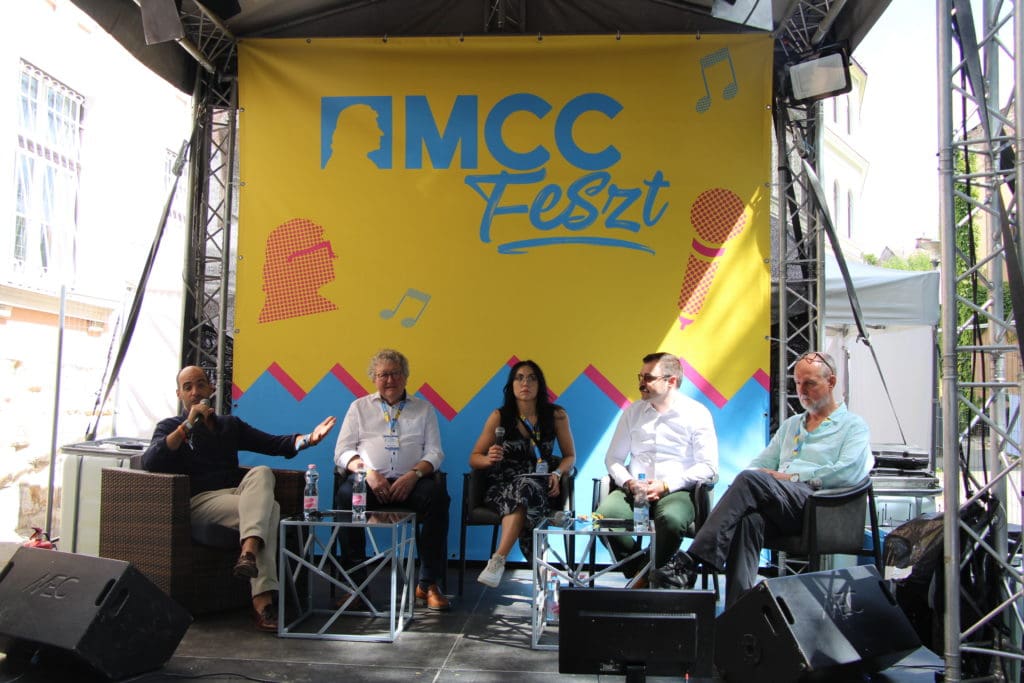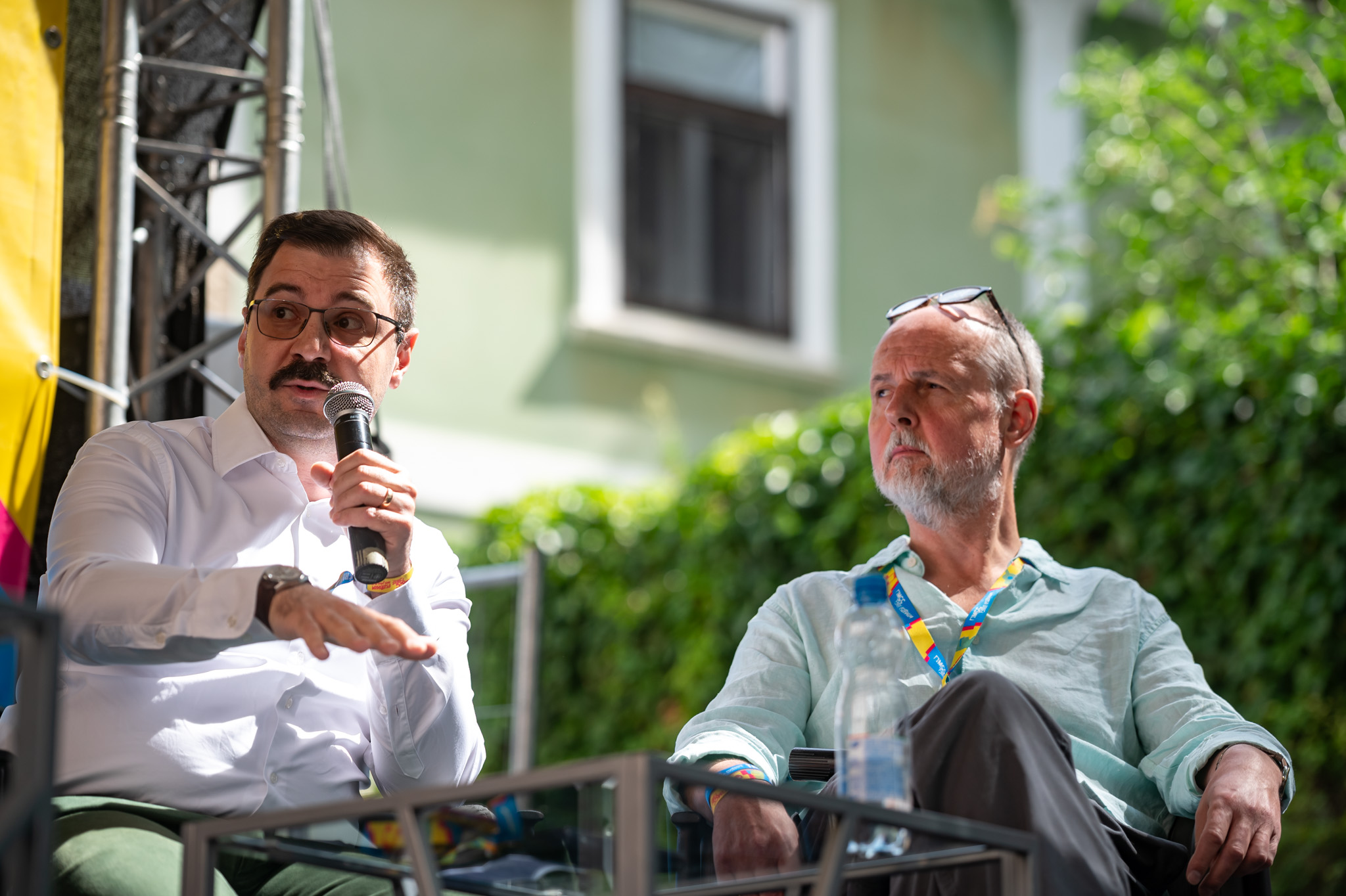We are here at the MCC Feszt in Esztergom, and it is quite unique. Tens of thousands of young people, most of them students, have come here to attend concerts, drink beer, and party most of the night, and then during the day many of them attend discussion panels and lectures on very serious cultural, economic, and political topics. Is this Hungary’s answer to the left’s culture war?
First, I would say that we are not in a culture war but a war for culture. Although I do not admire (Italian Marxist) Antonio Gramsci as a politician or as a political philosopher, I think the right should learn from him. He was the one who, a century ago, declared for the left, for the socialist movement, that culture is the priority. His idea was that if the socialists dominated and controlled culture, then they would win the political fight as a natural consequence.
But regarding the MCC Feszt, it is first and foremost a fantastic event. It is fantastic to see so many young people come together and think together.
It is indeed part of the so-called renaissance of the Hungarian right because it is not just the MCC Feszt. It is also CPAC Hungary; Tranzit, which is another huge political festival; and it is also Tusványos as well as many other events organized by different institutions, think tanks, and organizations of the Hungarian right.
All these events show that the Hungarian right is a real community based on friendship. And maybe this is one very important point that was highlighted as well by Prime Minister Victor Orbán in Tusványos this year when he spoke about the fundamental law, the Hungarian constitution.
He highlighted that while all of the other progressive or liberal constitutions, or even the previous Hungarian constitution, put the focus on the individual, the new Hungarian constitution puts the “We,” the “Us” at the center. It is about community.
All those events, including the MCC Feszt, the Tranzit festival, and CPAC Hungary, which is organized by the Center for Fundamental Rights, are there to fulfill this goal to build a real community.
One can understand the importance of this community-building when comparing such activity of the Hungarian right to the inactivity and fragmented nature of the Hungarian left. On the other side of the political spectrum, they have become so individualistic, in line with the progressive mantra, that they have also become fragmented and lonely, with no real community and no collective spirit.
On the Hungarian left, you will find no such event as MCC Feszt, Tranzit, or CPAC Hungary. And this shows also the courage of the Hungarian right.

It could be because the left does not have the money since it is not in government.
Well, in fact, many of the existing events, like for example Tranzit, but also many other festivals, mostly in the countryside, existed before 2010, the year Fidesz returned to power.
Interestingly, whereas in the 1990s and early 2000s, the Hungarian left was still very well organized as part of the communist legacy, and (due to) the presence of a strong socialist collectivist approach that was then part of the typical leftist behavior, things have now changed.
However, this is not out of a lack of money. You must have heard of how the Hungarian left was sponsored by the Open Society Foundations, Action for Democracy, and different unknown foreign donors, during, for example, the last Hungarian election campaign.
Do you mean that the Hungarian left has been funded by the United States?
It has received funds from the circles close to the Democrats, the Soros network, and the American left, to be more precise, and there are still unknown foreign sponsors and donors, who have donated tens of millions of U.S. dollars, euros, and British pounds. So the left did have the money, but they were not able to act as successfully in community-building as the Hungarian right.
As the director general of the Hungarian Center for Fundamental Rights, you have come here to MCC Feszt to take part in a panel discussion on Brussels’ conflict with Hungary. Does the Center for Fundamental Rights act in Brussels and Strasbourg the same way as the Polish conservative lawyers’ association Ordo Iuris does?
We do not do litigation and we do not do individual cases like Ordo Iuris, but we are very active at the international level. Three or four years ago, as we observed this very massive international attack from the liberal mainstream, from the globalist liberal mainstream against Hungary, we came to the conclusion that there should be some kind of similarly well-orchestrated action from the right too.
Of course, we have very good friends in Poland, in the Polish right. But our two countries alone cannot win this war for culture. So, the Center for Fundamental Rights, together with many other Hungarian conservative institutions, think tanks, and NGOs has become very active at the international level.
Our goal is to realize the liberals’ nightmare: the international cooperation of patriotic, right-wing movements and forces. We already have a very strong network here in Central Europe, and we also have very strong partnerships all over Europe, like in Portugal, Spain, Italy, France and Austria.
We organize CPAC Hungary as well, together with our friends from ACU. It is not only an event but a platform, a forum for all conservative similar-minded politicians, think tankers, philosophers, and movement leaders from all around the world, from the U.S., Europe, Japan, Israel and Latin America, to show the world that we can act in a united fashion.
A mark of our success is the frustration CPAC Hungary causes not only in the Hungarian leftist media but also in the international leftist liberal media.
Is the Center for Fundamental Rights linked to the Hungarian government or is it a private initiative?
It is a private NGO, but we have very good ties with the government and Fidesz. We have never hidden this fact. This is a big difference between the left and the right, at least in Hungary, that we, on the right, openly admit that we promote conservative causes and that we support the policies carried out by the government of Prime Minister Orbán.
The Hungarian left and its NGOs and associations try to pretend that they are neutral and independent. But at the end of the day, it usually turns out that they are financed and instructed by the Open Society network.
What is the Center for Fundamental Rights’ action in Hungary?
We have a broad range of activities. We deal with EU-related issues, both in terms of EU policies and issues related to EU law, and that is a very important part of our activity as a think tank. For example, we are very interested in the activism of European courts, which are currently leading us, I’m afraid, to some sort of human rights fundamentalism, whereby new human rights are now created based on human desires.
We also work on constitutional issues and related issues in Hungary. We publish books, conduct opinion polls, and organize conferences. We have a talent management program, and we try our best to promote our values, i.e., the three values of God, homeland, and family.
In that regard, how would you comment on what is commonly called “European values”? We hear a lot about European values, but what are they nowadays? Are your conservative Hungarian values the same as the European values that are now professed in Brussels?
Of course not. In my view, the real European values are God, country, and family, as I have said. And I think these are the very values upon which the founding fathers of the European Union started to build this project of integration. Of course, I can accept that there are different approaches towards the so-called European values and that maybe there can be different interpretations of the rule of law, as the expression “European values” has been frequently related to the rule of law of late.
However, the problem we have now is that the ruling elite in Brussels and some member states are trying to convince people that European values are exclusively their liberal values. This is what the Hungarian right will not accept.
We can hear, for example, that democracy has to be liberal, and that if it is not a liberal democracy then it is not a democracy at all.
Thirty or forty years ago, it was perfectly normal to say that there are different versions of democracy: There is social democracy, liberal democracy, and Christian democracy. Nowadays, people are being told, including by the liberal media, that liberal democracy and liberal values are the only European values.
As a consequence, when they speak about equality, they now speak about gender equality for the dozens of genders that supposedly exist. But this is no European value, it is a liberal value. From our conservative point of view, we oppose this approach and we say that the mother of a child is always a woman and the father is always a man.
The Hungarian right is only asking European liberals for tolerance. Brussels and other EU countries should accept the full variety of the European political spectrum.
We Hungarians respect that in Germany or France, they are trying to build their society on multiculturalism and gender ideology. If they like nations without borders and this open society idea, it is up to them.
We just do not accept this approach for Hungarians. We prefer to stick to our Judeo-Christian heritage, our nationhood, and our history, and we want to keep protecting our borders. An essential part of this whole woke madness is precisely to cancel history and cancel national cultures.
But to be frank, my view is that when we speak about Hungarian interests and Hungarian values, they are also the true European interests and European values. On migration, border protection, the family, the protection of the children, and even the war in Ukraine, Hungary defends the true European interests and values.
So when Ursula von der Leyen calls Hungary’s Child Protection law “a shame,” she is defending liberal values, not European values, right?
As I mentioned in the panel discussion we had here at MCC Feszt on the conflicts between Brussels and Hungary, the most important fault line nowadays in the European Union is between sovereignists and Eurofederalists.
Therefore, our conflict with Brussels has an institutional leg and an ideological leg.
The institutional leg is that Brussels and the liberal mainstream are trying, in the name of European values, to transfer decision-making from the national level to the EU level. While doing this, they are also trying to put ideological pressure on the member states that are not in line with the new liberal lifestyle and mantra using Brussels’ power.
So, when we amended our Child Protection Law in 2021, they said that no, family policy should be in the hands of Brussels. And they launched a new infringement procedure against Hungary, although it is very clear from the wording of the treaties that family policy is a competency of the member states.
Then there is of course the ideological aspect related to the protection of children. This whole gender insanity began with radical feminism and the sexual revolution in the 1950s and 60s. It continued with this whole rainbow and homosexual agenda. Now they have invented 90 or 100 “genders.” And believe me, the next step will be the sensitization towards pedophilia, as at the heart of this liberal progressive movement there is a will to liberate different allegedly oppressed groups in the name of social justice.
Our Child Protection Law contains stricter regulations to protect children from pedophiles, and it has created an official register for pedophiles so that parents can now check whether there is any known pedophile in their neighborhood. The same law also bans homosexual, gender, and LGBT propaganda at school and in the media for children, because the whole Hungarian approach is to view the situation from the perspective of the children. It is not about adults who can self-identify as “non-binary a-gender” or any gender they wish, even though this is not a legal status in Hungary, but when it comes to children, the state should step in very strongly to protect them.
Do you really think that, in the face of the European Commission’s financial blackmail, Hungary will be able to cling to its conservative values?
From a general perspective, this blackmail might actually very well have a boomerang effect. This whole blackmailing with the EU’s financial sources and all those procedures, like the different rule-of-law procedures, infringement procedures, excessive deficit procedures, and the conditionality procedure launched against Hungary and Poland, and also the different procedures launched against other member states, will lead to the disintegration of the EU.
According to the European treaties, the EU and its governing bodies should respect the constitutional identity and constitutional cultural heritage of the different EU member states. Brussels’ actions are contrary to the treaty because, for example, it is all too visible that the EU funds for Hungary are being withheld because of political-ideological reasons.
And you have to remember that EU funds are not some kind of a gift. When countries like Hungary and Poland opted for integration, they opened their consumer and labor market to the big business companies of the West. And of course, we also pay money to the European Union’s budget. Not to mention the fact that after World War II, the West put us in the hands of the Soviets.
So, it is not that the EU gives us money as some kind of a gift or friendly gesture. It is Western Europe’s obligation based on historical facts, based on political facts, and based on the wording of the treaty.
It is true that EU funds are strategically important for the Hungarian economy, but if we compare the annual amount of EU funds with the Hungarian GDP, it represents only a few percent of it.
It is not that the Hungarian economy would not survive without those funds. EU funds coming to Hungary are more important for the markets than for the economy itself.
Hungary is a proud and strong member of the European community. The difference we have with the left, however, is that when we say that Hungary is a proud member of the European Union, it is not for the sake of the EU itself but because we find it to be in Hungary’s interest to be in the EU.






